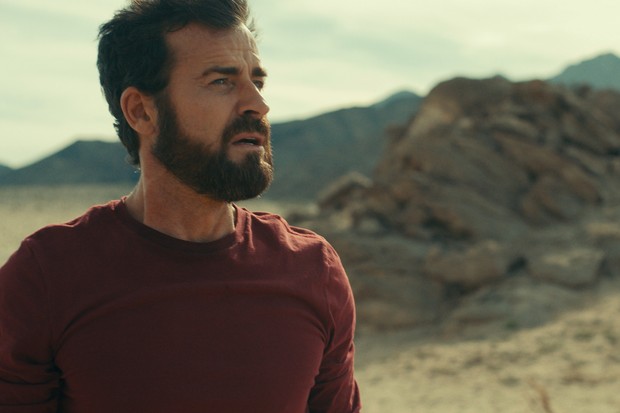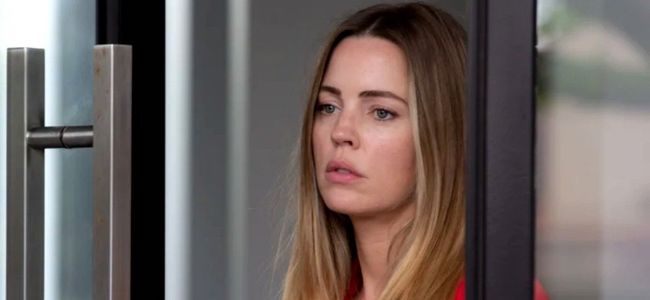“I fell into it like a manhole,” joked Neil Cross, about his profession as a screenwriter. “What I did want to be, which was considered absurd, was a novelist. I did set out on a deviant path to become a novelist.”
Describing his path as “wandering” and even as an “accident,” Cross has published several books, but is best known for his work on the small screen, where he’s earned credits for MI-5, Doctor Who, Crossbones, Luther, and now, The Mosquito Coast.
“I think long-form storytelling, which we have now, is driving the literary novel not unakin to cultural irrelevance. I can’t remember the last time the cultural conversation was about a book. Good, bad, or controversial,” he said about the publishing world.
“Once I was given the opportunity to write something for the screen, I found I really enjoyed it,” said the screenwriter.
Favoring the Anti-Hero
Cross said he grew up an admirer of Han Solo, but more specifically, the anti-hero. “It’s a taste where the origin of which is a mystery to me,” he said about this preference, “but I’m thematically chained to it. I can see that running through everything I’ve written on the page.”
In The Mosquito Coast, the apparent anti-hero is Allie Fox, played by Justin Theroux (and Harrison Ford in Paul Schrader’s 1986 film). The original book comes from author Paul Theroux (Justin is Paul’s nephew).
“I read The Great Railway Bazar when I was about 14 and then The Mosquito Coast. I think I’ve read every word that Paul Theroux has ever published, and I’ve re-read some of them multiple times.”
Cross added, “The Peter Weir 1986 version, in terms of straight adaptation of the novel, was definitive. So, when a friend suggested updating the adaptation, my reaction was ’No.’” Despite the initial reaction, Cross eventually came around when they decided to update the story to present day.
As for the modern version of Allie Fox, he’s essentially the flawed, smartest-guy-in-the-room, with a mysterious past, and a knack for solving impossible problems.

Neil Cross
Writing Allie Fox
“He’s driven by this compulsion to make everybody know he’s the smartest guy in the room,” said Cross. “The truth is, he existed first on the page of the novel, and like all great literary collections, he exists on two levels.”
“On one level, Allie Fox is an exemplar of an American archetype, the great American contrarian, the rejectionist. He’s Yossarian. He’s Randle McMurphy. He’s any number of Americans whose basic philosophy is an extended middle finger.”
On the page, however, Allie belongs to very specific cultural and economic circumstances. “He’s late 70s, early 80s, post Watergate, post oil shocks, post Vietnam, so the Allie in the book is really a disappointed middle aged libertarian hippie. Ironically, given the home we have for our show, he belongs psychologically and culturally to Steve Jobs’ generation.”

Allie Fox (Justin Theroux)
The challenge for Allie is deciding who he would be in today’s climate. “If you took somebody with all of those attributes, and moved him to 2021, which has its own set of cultural and political problems, who would he be now?”
Noting that you can’t “copy and paste” the novel character into today’s world, there are other ways to think about adapting this character. “Neither can you copy and paste Oliver Twist into 2021 London. You have to take the essential attributes and explore and examine how that guy interacts with the moment.”
Problems and Solutions
Not unlike Netflix’s recent reboot, Lost in Space (2018), the Fox family in The Mosquito Coast often come across seemingly impossible-to-solve problems, like being lost in the desert or hacking an ankle monitor. But, despite the odds, Allie has a philosophy to every problem: “There’s always something.”
“A writers’ room would describe it as an inside-out way of writing, meaning I first think of the problem, and then think about how the specific character would react to that problem. So, usually it’s problem first, and there’s always a solution.”
Cross said that’s a line for Allie but also something he fundamentally believes in his own work. “There’s always a solution. I write as such I get myself stuck or write myself in corners. I pound my forehead against the floor wondering why I do it to myself, but it’s a compelling way to write.”
As for the TV writers’ room, Cross said, “I don’t work in the writers’ room in the traditional way. Writers’ rooms are supremely efficient television-making machines, but I think the machine they represent is a model of making television that’s dying.”
The showrunner is talking about the old model, where 22+ episodes of television were required per season. For a show like The Mosquito Coast (originally 9 episodes, but reduced to 7 due to COVID), it’s essentially a long movie.
“I find a traditional writers’ room, for what was going to be a 9-episode season, I find it inefficient. I am a benign dictator, but I am a dictator. I am a control freak about these things. So what I like to do, is provide the room with a 2-3 page outline of a given episode, then work Socratically with a given writer.”
In this way, Cross can work one-on-one with specific writers for each episode, then seek outside help as needed. “The actual physical, in person writers’ room for The Mosquito Coast was a week and a half, mainly sitting in a room getting to know each other.”
Creating the TV Writers’ Room
Aside from the non-traditional approach to the room, Cross said his main approach to finding writers for the room was people he enjoyed talking to and spending time with, as opposed to anything specific on the page.
“So much value comes from conversation. That conversation involves mutual respect, but it also benefits from a certain amount of disrespect. I need somebody to look me in the eye and say, ‘That’s a fucking terrible idea,’ because deep down, you know when you’ve got a terrible idea.”
With this candid team, the writers could then focus on style. Each episode of the series begins with somewhat of a cold open teaser. For example, we might see a taxidermied fox getting shot, then later find out why this is happening, somewhat like Breaking Bad or perhaps Ozark.
Cross said he didn’t have a technical name for this approach, but it came from a British spy show he worked on called MI-5 (or Spooks in the UK). “They had a great editorial attitude, which means you can use any technique to tell the story.”
Examples include flash forwards, dream sequences, flashbacks, framing devices, and everything in between. “Use whatever you need to tell your story in the most interesting, and arresting way. Do that. There are no rules. That’s the basic approach.”
“There’s also a little bit of me just saying, ‘That would be cool.’ I want to see taxidermied [animals] shot in slow motion, because I think it would look great,” he joked.
Writing the Mystery
For The Mosquito Coast, a great deal of the story revolves around the mysterious past of the Fox family. For whatever reason, the parents are running from their past and it would appear the government is out to get them.
For such a mystery, Cross has occasionally reached out to third-part readers to make sure nothing is too obvious for potential viewers. “In the past, I’ve used various advisors. On MI-5, we used ex-KGB as advisors.”
The series has just been picked up for Season 2. Where the first season is essentially linear, Cross said he’s unsure if he’ll follow this 24-like narrative for the next season.
“Season 1 was going to be a little longer. We got interrupted, but in its bones, it’s linear. But it apes a travel narrative, so every episode is a different chapter. That’s a nod to Paul Theroux. However, we did have a dog-leg designed into it. We did have an episode that took place in the past where we answered a few questions.”
For those who have watched the entire season, there are some clues to the Fox family past, but there are little definitive answers as opposed to suggestions of how this family made the government’s list.

Margot Fox (Melissa George)
As for the future of the show, audiences will also notice a shift in narrative. It would appear we’re orbiting around Allie Fox, but Margot Fox (Melissa George) might actually be the center of the show. She often broods and emotes with little dialogue. She carries the burden of the Fox family and could snap at any moment.
A Shifting Narrative – Allie or Margot
“That’s a deliberate contrivance. Allie, himself, sees himself as the main character. He sees those around him as orbiting around him. His daughter tells him, ‘You don’t need a family. You need an audience.’ Part of the aspects I enjoyed was beginning to reveal each of the other family members in their own right, and suggest they have their own wants, desires and needs, but also their own story.”
The essential view of Margot is that she follows in the wake of Allie, but as the story unravels, perhaps that’s not the case after all. “Then, as we move through the season, we want the audience to reconsider their assumptions, and maybe even consider that Margot is the dominant one in the relationship. Like every marriage that ever was, it’s much more complicated and much more shifting than an external observer might assume.”
“Justin talks about this much better than I, but one of the main narrative challenges in Season 1, is not only having four main characters, but those four characters are in most scenes together. Being able to reflect the complexity of that dynamic, without being confusing or repetitive, was incredibly challenging. There’s a kind of Algebra involved, which is tough, but rewarding.”
Part of this actually falls onto the environment, where each new episode or chapter is meant to “hurt” the characters. “Hurt is a great word. I’ve got this weirdly vengeful approach to people I make up. I want to see them go through stuff. It’s an aesthetic, more than a dramatic choice. My basic narrative approach is, what can we do to them next? Different pressures and different environments allows you to see different aspects of the character.”
Because the story was a travel narrative, the environments must change in a linear narrative. “We knew where the story had to go,” said Cross, “and where the Foxes had to go mirrored where the story had to go. So, he’s been through the wilderness, the hacienda, and one place we haven’t seen him is in an enormous metropolis, so there’s the requirement of the story, the environment, then you drill down into the specifics.”
As for screenwriting advice, Cross joked he’s somewhat scared of the ‘how-do-you-break-in’ question. “I don’t properly understand how it works. When I do speak to people, everybody’s got a different story. From an outsider’s perspective, and I’m an outsider, there doesn’t seem to be a single model of doing it, other than, the rocky cliches of taking lumps, or if you can stop, stop.”
“Clearly, it’s tough, vicious, and Darwinian,” he concluded. “This is not a satisfying answer, but the world is full of people who want to stop you from doing this shit, even people at your own level, because they want what you want to get. The only real way to address is, is to keep going.”
This article has been condensed. Listen to the full audio version here.

